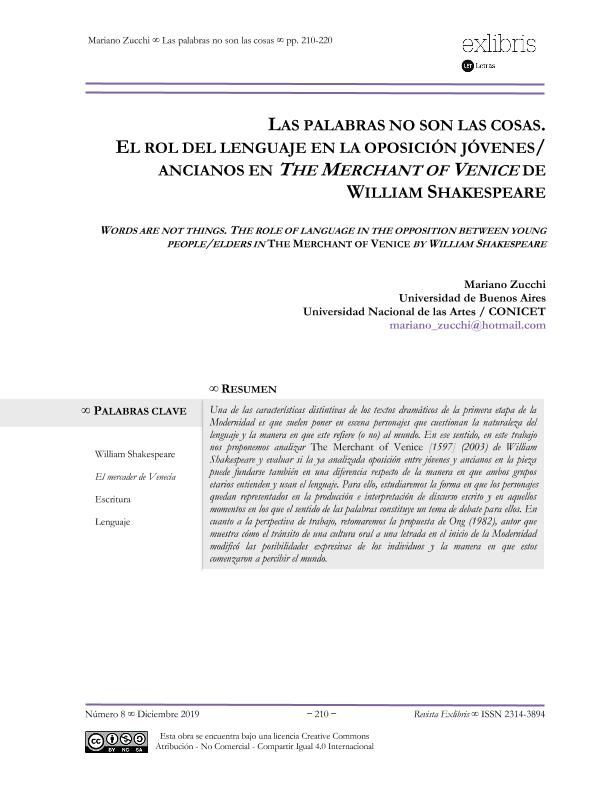Artículo
Una de las características distintivas de los textos dramáticos de la primera etapa de la Modernidad es que suelen poner en escena personajes que cuestionan la naturaleza del lenguaje y la manera en que este refiere (o no) al mundo. En ese sentido, en este trabajo nos proponemos analizar The Merchant of Venice [1597] (2003) de William Shakespeare y evaluar si la ya analizada oposición entre jóvenes y ancianos en la pieza puede fundarse también en una diferencia respecto de la manera en que ambos grupos etarios entienden y usan el lenguaje. Para ello, estudiaremos la forma en que los personajes quedan representados en la producción e interpretación de discurso escrito y en aquellos momentos en los que el sentido de las palabras constituye un tema de debate para ellos. En cuanto a la perspectiva de trabajo, retomaremos la propuesta de Ong (1982), autor que muestra cómo el tránsito de una cultura oral a una letrada en el inicio de la Modernidad modificó las posibilidades expresivas de los individuos y la manera en que estos comenzaron a percibir el mundo. One of the distinguishing characteristics of the dramatic texts of the first stage of Modernity is that they usually stage characters that question the nature of language and the way in which it refers (or not) to the world. In this sense, in this work we propose to analyze The Merchant of Venice [1597] (2003) by William Shakespeare and assess whether the already analyzed opposition between young people and elders in the piece can also be based on a difference with respect to the way in which both groups understand and use language. In order to do so, we will study how the characters appeared in the production and interpretation of written discourse and in those moments in which the meaning of the words constitutes a subject of debate for them. Regarding the perspective of work, we will use Ong´s Oralidad y escritura. Tecnologías de la palabra (1982) as a framework, text in which the author shows how the transition from an oral to a literate culture at the beginning of Modernity modified the expressive possibilities of individuals and the way they began to perceive the world.
Las palabras no son las cosas: El rol del lenguaje en la oposición jóvenes/ancianos en The merchant of Venice de William Shakespeare
Título:
Words are not things: the role of language in the opposition between young people/elders in the merchant of venice by william shakespeare
Fecha de publicación:
09/2019
Editorial:
Universidad de Buenos Aires. Facultad de Filosofía y Letras. Departamento de Letras
Revista:
EX-Libris
ISSN:
2314-3894
Idioma:
Español
Tipo de recurso:
Artículo publicado
Clasificación temática:
Resumen
Palabras clave:
SHAKESPEARE
,
MERCADER
,
ORALIDAD
,
ESCRITURA
Archivos asociados
Licencia
Identificadores
Colecciones
Articulos(SEDE CENTRAL)
Articulos de SEDE CENTRAL
Articulos de SEDE CENTRAL
Citación
Zucchi, Mariano Nicolás; Las palabras no son las cosas: El rol del lenguaje en la oposición jóvenes/ancianos en The merchant of Venice de William Shakespeare; Universidad de Buenos Aires. Facultad de Filosofía y Letras. Departamento de Letras; EX-Libris; 8; 9-2019; 210-220
Compartir




